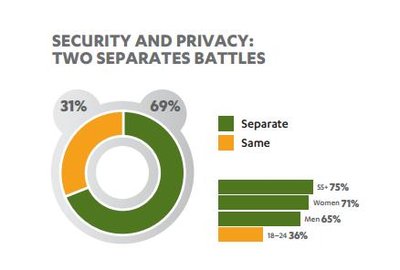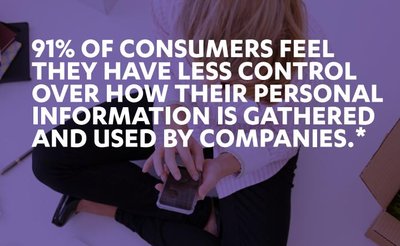Privacy and security are major concerns for online shoppers, with 91 percent of consumers worried about their control of personal information gathered and used by companies, according to a report from Adroit Digital.
Online privacy laws are designed to protect consumers from fraudulent activities, but 73 percent of shoppers think online privacy is an illusion. Luxury brands with ecommerce options are handling information of consumers with higher credit limits and larger checking accounts than the average shopper, so offering and upholding strict privacy and security regulations are vital for gaining consumers’ trust.
"I think the one thing that everyone needs to understand is that you are talking about data you are collecting," said Rania Sedhom, managing partner at Sedhom & Mayhew, New York.
"No matter what you are collecting, you have three responsibilities," she said. "One is protect it, the other is to store it the right way and the last is to get rid of it when you are done."
Ms. Sedhom is not affiliated with Adroit Digital, but agreed to comment as an industry expert.
Adroit Digital was unable to comment by press deadline.
“Privacy and Security in the Digital Age: How Consumers View the Collection and Use of Their Personal Data Online" was conducted from July 29 to Aug. 25, 2014. The survey targeted a random sample of United States consumers who self-identified as 18 or older and who own a smartphone and a PC. Two thousand people completed the survey.
Privacy, please
Privacy and security are two separate concerns, according to 69 percent of the people surveyed. By definition privacy deals with the secrecy of something and security is the freedom from risk, so online, consumers should be able to make purchases in private and do so without any dangers.
For a consumer, the notion of feeling safe is overwhelmingly more important than transactions being private. The level of security changes across devices and platforms.

Security and privacy
On a laptop, consumers generally feel safer than on a mobile device and social media sites carry the greatest concern for security and privacy concerns. However, retail sites are the second highest concern among respondents.
When it comes to trusting a merchant, especially in times of security breaches, 45 percent of consumers feel as if their financial institution will protect them, and not the company.
Consumers have a deep-seated distain for abusers of their privacy and security and claim that if there was a breach they would stop using the company and if a site were to sell their personal information to vendors they would immediately and permanently stop using the site.
Also, 39 percent of these consumers would remember this security breach forever.
Government regulation is another concern among online shoppers.
Seventy percent of consumers do not think that the government protects privacy and security especially when it comes to the digital advertising seen online.
The concern is even greater among those between 45 and 54 years old. This same age group is also more uncomfortable than most with the amount of information that online advertisers have about them.

Consumers lose control
In regards to online retail, 58 percent of consumers are uncomfortable with the amount of personal information that is required to receive special offers and services.
Across the spectrum of the Internet, the only truly trusted sites are bank and financial institutions.
Seventy-five percent of those polled trust banks and only 4 percent trust retailers.
Travel sites and applications saw the lowest results, with only 1 percent of consumers trusting their information to these platforms.
All of these concerns lead to challenges for online retailers because, although problems do arise, there are inconsistencies among consumers.
For instance, 33 percent of individuals do not read any and only 53 percent read some of the privacy and security terms and conditions.
Also, 75 percent of consumers believe they are freely giving up some of their privacy rights by using the Internet.
The problems and apprehensions about Internet privacy and security could be lightened with collaborative works between the government, online advertisers, consumers and third-party entities.
Fifty-four percent of respondents think the issues are solvable and 59 percent claim to have seen improvement over these issues in the past five years.
In-house problems
Privacy and security are not solely consumer issues.
More than 63 percent of retailers list payment security within their top three priorities for 2015, according to a new report by Boston Retail Partners.
While most retailers have been breached at least once, largely publicized data losses within the past year have brought to light the need for further security procedures. Establishing revamped systems can help prevent hackers from accessing client information and help retailers retain consumers’ trust (see story).
Last January, Neiman Marcus worked to fix security flaws that made December 2013’s credit breach possible, but the extent of collateral damage done to its reputation will be measured in the months to come.
Although the less than 1 million credit cards compromised at Neiman’s seems minimal compared to the potentially 110 million affected at Target, consumers were understandably rattled and even outraged, which likely hindered sales. If consumers feel that their credit identity is at risk with every swipe at a major retailer, the damage could take years to mitigate (see story).
When brands collect information, it is vital that their consumers understand why the specific data is being sought and how it will be secured.
"Things are going to change, they always do," Ms. Sedhom said. "I think the main thing is for the brands to figure out the information they need and tell the consumer where the info is [and that] we take your privacy seriously.
"It is two-way street," she said. "It is unfair to blame brand marketers because they are not forcing you to provide info. It is voluntarily."
Final Take
Nancy Buckley, editorial assistant on Luxury Daily, New York
{"ct":"J0ZxTu38oLwFE+QmJ8MSPPyJ2jBkRTJFwvmoL5noS2gCuoeWyYBG05mmCAuashwBN+1Z83HxZ4U+JnCm1Y6GEEFmX8ubFnsSssbwkvEjO8NOAJWCxb90msjVYOrIeMHBsQYzVquCKuuvW6pnGPmjur7ForX8nqi3DQ7+uCLqBc4mPe2XT\/ZQWEeu9d7W9UA6H2\/um1N4QZqVyWHpYpBt4QQDEe9oJlrf3Jj22kDjyABZ\/cVrtInRJowHz2EhCkNPuBVYQ+avLkFIx4Spv7L6cQXaMWlINBZjmG+puwsTUvgaxx\/Tm0gxHvRea5jI6lNODfGt7VToWJOBNd4K\/D25VUUmeLtVs4PG5zSE5mdAKgKl0RERPWR\/7ZbVuay7H8o+Fw2u\/qlo\/P\/yImvJW1kYLKHVARuT6Lnflbo6EGwnPXOSVpaV8vTF\/Ov5YvzX0XwDe8\/ccQk0h4klzFWAQLC5Zh3b2PH7\/MT7XPh5NlrH4OGToHciNfUUoiQbakd3UyuEzVrXfq7ZHUv2iry7zYfYD3UaZsbKiKuivsB8FHQf\/TGXJbmdbpRTtkbfIapiKww7kN98yQXRYbsoeFsMWiFFDLKcGibnqSTlPirZ1LetRSwgRYkf5Zt8twuykGj3rZR0UFvj34NlfgiS3qlLhTqAA4jGjdKXM4BD5MjkyzS4MM27K0pBL9+1S1d3hCBTidvlvaT7q5r\/NVrYMchCq8u7ITSVerd3QOTG4Uz0+hWpT+PYS5g5nHfcEQnTmJs0H1l+jiqXMjTG+cwL2ohs+gSZShqvcz6K8jPSdGoPloAnFz8sVJ2STeUFXhwa62XGDctGSV4jWZh9BGZsSFr9i7EU3iDNO7wzffqseWrHk1o9WFXrZTxhef9r04UAt34uw3HGVNDXlHZwuugtmlUQZl686wmTjCPzT6v+r3T67JAll+Pa9am8BLZ2utOFhEd+Enm\/5+L2rl\/YO+dDo0Myrlge1S7y4onT9JFUIrTOJ6yLLpgkvggKJncostdbn1I8WmLtJS7qkDNuVfF30dN5jYERLf89f47M5ac5LIsZQfMYg5In4UBdFViPiTKEFbiCau6cgZInoghp9UO4DOmAyS3B2qb0dMotQDgeWoruxaBwIHTiJMAWJrmueAEUrOQF04Igm1fKZCnwrhzub4niV2ozcOxXeQMj+DCNwVdWhnIpnY1GI2+VeL\/H6FVjX8krQPf7u13qt9lExvdVaglC1fwq\/fsFcKXo4aNwXC07cVPNb6GFeEzLVgK9nhKY3E0yCANOoDvnxhEy0HrVgh4zz3TKhUnTIElaAeONOSaybReDddC2WfPFfxfhOMYyYF6rv1MOFPMymok9i6xup96AaRxV2X1YMp81K04FLsYV5r4EWzQc23FsZ\/GAowi57Of4RSvg4C1qepe2fn6RyBQuIsC9axzV+HFGsU7bLoBsDHs7WRvFxVdrBm4j8OXRkWJKLRoO2MAteNbLKHmhy0Oz0HHDXd5kSo67djqqNl4O6ix1OuEgwbU7lUpJa67c9K20ex+T0BP8sUYfEd4sclRDMKmEoCbqKqRmOH8xiNAUV7M9ncQt\/EBjfjKu9FpDu4Go00d4AG\/F8W35p2QT\/atW8WW4VvfXX\/YlSm\/9VFebagEFZz5alBGNUJH7h04MA3LRlBMtB30iLDMlZrlxulakyXn6yKvhtYQ33dLY0pFCQDfEyrDOUYUbGCYDYwN\/7Q4OFpp\/p\/CKOhsGQL6vM4IE6h8u\/3JF0L9bZhFQbnIcwcRJI69H5GEDBIaz62my0IK8TeDzPHRJy\/9P097Cl74waDHA7GyKj+vlu8Wf8M1VZx2PcnV3fBcsao6abO01\/Y3u20iVjZMM5Sqed3CWsmm4SdxfkENuTv+V35KbRYP7Db7vPOUSURX3YcM4gxairzjvfXYA7UYyJjKNNWf5MMCp+jzMDPVXvb0SKJzxSyOWKkEyUGXtapcASpEG911G7cIpYoxm8wMeB72hDiz10WcmGBJqSlusI3CD9AtoYsSlnPRr1KaOzUIXvLA7L2iVeTxMNYxgWND24WMizBSr3Furf8Uy4nfX2adwHnku9LoUjbMn9KYcTjtG8de\/UR8V1ybFsukQ\/x4+YRfALWxHCXx6iG43LXpyLvvpCumQ3\/EsQwn+bIjq5YPxY2sYt2q1H7ZdWs7iH92dMPpSMNrNBcwaO5dwQ+lVGowbVP9\/bbRAFPQmq7JI5vfK9s1qssDiZClSB2qc9EKt2D\/MQ96+QtX3znKxB9riv9INAbvLqsHjkflFBN5f0HGnbzxJqAalPTjoEWODFWnHdM4Igr7LnHiDR3jl7AzkXWiZLPbVI73hmWoVS0KydFWg1bLsCVwbmG2nAnsqQl3O9dhbXtzfvznkgf3gYTyGWUro+45jCUTHQz3ivs0NVWpqaGH43Qb8F5HriROHdet5\/xAuQbKy9Ja+fAb1oS3RbfkahxQbMCzXuRxT4AhS+p4ol03I0qxbJeVR64TkudJ0\/Q5AmIjeqFM\/0IOTq6Vp9oj1lGRvzvHWsuzylSgZLmq7P5Ct\/dZCnvjLHMe+zuODfRY1HM6lw0rrOhuiBhGLonnDfiMK6kWQyJzJ3DvbtY37c98QTD+IF3ltTkXy+CqE6dOfbpVnzFvCB8J3vyBtWc9zLcZWX51FZ2msVv5ZY31dD3PR95P3ERQ4Npb4uv8J7WDLPB5tFToVP\/B7I1vXreTfCatJ9Utdu48pEssLecsKp392DJeMX4WngpTAQ6MyKr93jUfx0U9iszkyC+A+esjE8+eIZUqsrWxUZV95VX9KrQIkJct4KCJJefXMuu1ybUXAAqz02aydJYzzexIvY5FGzhqjyyaNLrhrX2UzyMxEgU4SV+G8U8sP56TXRfYR5iVck0+6ZZjg+CsphqUQlOq9n8nkt6X3OGMRs+ToObotZoqloOGL\/F1iqOnGO8OlmdjqmLtLCHtZm0sUGIRiQhFKiT454gh+OGB4qs3GPBuTRlKGfNqN\/dIDtDq7WMNjIH\/gPPx\/qsVmsizPmfASg8Yf15atOKecKod3yuBZUblQ85WC0CRSh41z0+uQHpaudWDQ6azu6SG0+PshbrNjxO+W++l\/8H8rfrgCpFjJpSROgdem+w344xOqa35XRg\/cWg6HpxGwFwfb+UowtPUgPKEK20LQApnbwPYfnNnqAvE3bPmefXamEWPDSPaXVFg75\/Ua8T8M3xWaQ5LQ1FF3NgDqDypXEBPh54BpXYfpG+aq5275el3d8aXtsAFED7ldwkyrxha2O\/o3j1kUz0J2ZNF7nNFMPhlISpOZ0nsXfkpvgbjvWAEUvvZdxwEQn\/vhyKS5T+H8afnQ4h4bwzJK66QYVkX9zyCL2KMU2\/2SWumw0y4yt+cjQpgdG4U27O3PiLRLu2\/+qdPSlkpqirXG7iE4PkoAWHF9mDVR9eanBXMBeudn6SGw0eaefki332APZB5ghCD7YNh2ybPh1+dGc5QTs\/JFMXdb+xKDxtIYhNXoVj4499kqTGKxDCwXrfKd0wNAIlXIt2FIbzT870PIEZKFAjIQyWqIoTY6h0EOn9te0VvwWnx19xt1\/T3dQeZGaB11vvpcm8+\/GiCSZtNw2f0C859JthnPT+wXfyom47JQemGkUZMcL2nrp0t6mHQqax1Ujdd5JyzJF1WYhRSpB1zZbUuk3TWa5hIQ3CiX8+1LBl932g3zfq2aLj5OsVHkXPVxYqsLmXVyaLsHhDUJmyLy1KaA3aDZyRBRkQY0V3+ud9VqTZIeXdT5CUvJ+vo4hKhiar+z7iUomjjqweB1Aw3xVy8x5ID5ltx76X9u+9QC\/ulByLqA7lEGM4oqjWmcE7XUGr4NTjqQoXo19bvcje2+MLVCzDrx6yiKH4kRPfAzWAKvZDyNIs5rD+XcWAqaH3vbKGhDNF8PKTOKDKmLOR6RIwqNE6oav+tmtfackAAixYhbLg3mm+gm5\/hF1AbmtKEVYAvTOQ5egGME\/e34xWk9L1F+1qP2gIlaxs0z4IuYKAjRVVTT0BRLgBw4p96QTq4Znn7XCbrzPAoOCJWAhGw0sZaPPVAJIpbJ\/Mbt+zxQco4vNsARuA4d4Zh0Eo3vpofVWuC8z7OKLMl6bg+7HiDfunq6c9ghkkV9GVmDZFYmTSSZCPEP6UzXI6Rr5FtNhVSxfuCglJ6\/Kk26iX28G+CLOj+jjlIxL2bfyhiNi\/DQBsae4DkabA1oQRulyLMtafRNlcFWb+wSVmiapGC1tJ\/RoALkG8y\/vkdz7mR\/sOrG\/yPRptCzAkAC2In46mVqQKVo4+wleCKs5Bn1rlGB+kR1Jt71nNi8Za861rpNsyDYJcit4dOxTICXkceYy3efdkRQ+ue4EuWYmLcG15iXbemuS5+lnHw33kchKD1kCx2Y34mrgGlnlB8giOz2ObtJQo+E526k1jE8Tcz\/8aunWIvH61ROKbQhv0Ee1W57jJDTIzSFQS7HMZ2Wa3sPiUAORxrYPuKsIYmdrGLJ119B\/Uog5qQDH0QFflxxPwcBO9BK8g+GNYACaqJesqT1d2FM50qxZvHvBrAJOF1c+yanSkng8vSObfrXSnwmsq0n0LS1hWvoYyP7C4OXgDoGu\/OAPALYMJg2u+T7HkzIwoOZkhobKVk9TLmNsZKVGcUbwGEcdgScnv\/251\/TuJK1PgqyhxAC8aNgm5OX5pblVXD9C8tggEk9PDgUxCY1qGzi+S0Ax3xC\/qyTbH0wEOPzdZk9KbKcgwym3MPDrOrCyAvdDvla\/ZAuZy3B+ixiUb4ZEFeqOa50kwOa6nlvaVEFsPZ9cu1dc4ajyAPhl60t8wPY9n1oDa0Z0QZUBdmMyk3x4M40bIsw1Rd8+AcczGx0mQ74NbiIuOp1kD40GzSmvkrjOCL3H5DxJCUPed1q+TXyR4fCnHtZ59J1rFnz7R3eoA1FTcNU04kl6AcGjCGL2SyNwDmAR9SyoBnic+k8i9Aj6CgWljfUKEpcf4pyGT0YtG9KjATfTf2AaPhLBtKx3jgQ8mkK\/cK\/33z\/GV52Py\/bibbvFSAc1yF9+fhH1dl4iSxk+NAxy2j\/lJN2JGcgY5tZtOzpe5UzDC9SeU2eWWxuPDcg8T1dx+WOArXtypKcfwCbf2QGu5eBRcyMKY8Eo0mo+HAMDJYa4na0bNMLE\/JLrdx23JFU4Cxm4vRU0eADS4CEZzEm2Q6eljW9crxSuGyc5vrESNb43puvhRA9dG8h+0ilHE7xjqnM4LxLQFyNFI5arwN0XgqR3WRnxN6sXahTUYfXg2v1dz5\/FAS+SpFeWX1rWNoY8pZ4WLVi\/IdCRw3AJ8+k4zKjUSw0BmxEyrRnFrhYB344RWc8WVU6Jx6Wb1i15Vjy7mi8O0LMCH4K+GaIJlfjdqFN9k6U4LUr8LRuEG8wlfBxY+cLIlc4Be4ba661FDanD7WIn255VW96tpcE1JNIVP3gpxIlhEy0iaY748d05QXRx4Mm+BtkUhDMydCi58p37vmurD3LV2mEGpTWkmmG9Or8ce4UGUvojTI3GlKkVUHZoY4g0\/ppax8t51ZyztXNlbsTQOVxmQYWDEgMKojyg9\/Xh\/Se3BUO8UPw98wu0VrlJJFdNf+E\/RVD+UPAG0zfLUstefQ79Yge3NOIKCN1OWbNiaVGunhSGf1exwuQMMPvBazC6EfhKiTIzCsx+e6TtsKoMFnBbQYcHQwhq3vXgqufZFZ0jDnS\/nbic7n4jbLYKL1DwwWCgDULBEgmMrdOd4JJ4XNVip3uQPCl55kaTYmwoWewNH7RetC\/S\/6Mh+N57a+HCq2kPyhKU2V3CEsrytvkNPTQfiLAkPIbdlGKZZy3YPUQgEJtS64X8\/l5lKVuvL+nB4E07hd\/jFywNSggbwgJF6xdooWBl1LifNwJuCfpQhFm4iBEcLKitZHxj7R6YpGlsvyRQT99oN3wKkg0IH\/zKD8aQgs+PvP52XLKey7aNrx4DDT2+DMvPPzTO70+ARdtzbilJ3ExyLioyTniJPHpwlxZwsf5SZ5+kvOudrDAuyA2mBdwUc0\/cjMHePeJJpYV+a2dwXjxcFIO9gTl6Aa95+l2LyFJ1Ss1Klj+V373JHX05NLRMtYQQLdLQr8FvLFsmuLr00hnRwlUANvIayAhQSMwNwC6S61DJLTMqUKFxlkb+kplLB42oFbLwIiATuqt0p0Ej3yP+7DtxfdlVOM1OQh\/35SlRRI+tafTeX3W15rir4xmyjQYZBgpoxpwJoAotSb7QUzSbwjki+tB9TRX\/JEzieEDk2BzDMUeGlCSG6cnrcJcrp0p5VfN8hVKFLyxS3KtDi213TsgVMKqhfKBQtzGH7frOSPtv+U6Ca62MtGYWFl7W6EqsWIp9JP21I2r5da4XsQUoSDBw+oQIM4p9r7H+tolxIH1g4ajesR7BSs3wkKBZaqJtxWqwq\/SOunLKr\/U1uafjRqcoi9eD1K9zRnxtvTA6x6iynl\/6fq8crifiId43WiHNsO3jV1llkXmsmuYlXvN5sXZx3LtaZUrf5c62vl\/Cm\/87l5\/CN9Zoumcg1LkIc3xB2Q\/qaRlwahZTGg5Tfq0dYRNFl4pmtwiyqT61QkQxDrgauQOaR6weY1w\/wWWrLFzrjtmpyuBJ5MyM9vGBszA9NY713XOjSsC85Dq3j9qOfvp8pdscp+wT8A7qKnfj75II3kQs2R74YnLERcF9dH4cr05yuGCrk2J94pDSiDDgWPJ4mRLMWNppUZeVLmgBHcK1o9kktWZO6V8C6Ha83WmbaRdqxZwj86wDeYfaqpTER8plNjduJ2297RIP7mKPDKbeI8EY0+lH5j50\/fiTHL7li0FOOcN61NLNKnNT89m9Cq7so\/nJDQzTFaLHOvTnwpyv6k4m9CMysZDcg1jQxASKGwslo7elgK9G+\/V597zv\/QjSJmYgrHt814yovEc5U33y8CZ4oatilKHQ2QSlebfJE5TZhyT4EKTj9bRQCa3bQM8BarOIKbTKVO2hNIe6\/32br2vSK+1AlfcFDHwBKZVHQllBpXFhYy6NMl9+4RxmlZGLMsg+Ne\/i9rIh+kOWucZPK+i2LgbFZLcWZTdGdBGSu7jfNfX9o9YeW+Vd+hhnmms4zOibJPwbDAjwpeVlBI5RCc1tQzt\/w0PtiZfddeSi7DwEvxDJogIy4XK4SSzd6ex1wZsv1UJY8yVJFXGpvDYuBh1G0jS\/zPa\/ST3gzEnZTb7MFsq0MjJ8VV9\/dR0r2oQk9\/zNBI4PuGnpPKTDH9lQVXBwG7US2v9ODN3maSbkbDr\/UA3bvHpcQivyCktqgTYSl3CIgPgHp871Qc2NRAWh6STMFYzsTLnaPk+5fHLc1kVelntrlQTuwFM1v14G5wXK7J6T7CRQaPI9kiW5jPLicxNReOuEiYPSDUPod3u1mX9jq65LjYB2eBeQ3L+LRycjYrBP+f9gC5b0tSn65\/Gf+fzebEqx6OqRuRDD5fTjgoLuGLTZy51FpG8d1I\/VZxkefTsz6hhem3gZCq+kZdzlzcJ7bto2lxfePuLLdCb2KQdEvpisuRJ8G6a19ZTagROe6inMM37iI23mDtTcqF5zQCo5Mg5LeG73+Bblyc1SaKGVA1Odnqam1HvwEeRtLkiPI7gToeCG7CaC6Sz8X7Jg7crQbfm4jpa81oieTowkiuPG+TfwpwqUvTsBitZfQRCU4ANZD3YM0vsL3E8o84QhqbyAypgeI8bD19gvWzEeadCQnvdFQ4qPXdGWmxHul70cCuFP7b2FFi1up7yQkRJHYQ\/YhwoaZOBt4d+cx3CgtCpMxcbEYc7U4iSwoS1ZzZNTnQ8+8aScUrZRaN+jzHzLSuHGJ8yR\/3OVMuFK4N5LH5t5zyQf6n\/Gk\/MIpDQbbrwWbD7QH8359RbvmtywPWLWv5NQLQbt+h0vinj1DVa6mdzQyHqmsyOZ7GHAQqHK5pyp1+VK4KEa9R2zCxKu2+oNGr76yHCivP7korsJCZaH3vvaLmcnihFm3B1hazeU52k9h5DdSocmXK75OBedqD2dhR6L5hdKu3qUgvjzfYrdxKd66O2sO3YO40FiX3qHh+FLnBhG1f3qe+2hnYMJD0AK2osnXSmRFKOg6iuoeepu3VXI3d+RtYubLkP1onpzMfbjrputEwN1wn6dRyn+NDEmLzzcIz0STFSJ9N7TOOwxhWczpVPpaPUsnTgSUm5q6FUfATT6Q37pW3l+0NGHQmNDzj91nyZkTEwEDPRACsjzhjdrOPvDHVQKK0JjEVyIiqj8+PSOt1y6PUT+lEVOMmPwJ9chJ4xveNHgcXoQSoLlrJCWZNkBD7m7laEhA237\/bX3YgIB3y6LazzQFK3nyStFwa3J\/LALrB6AahAB0hawIvUXlPyFjKNZKqoOufXo8\/kD8D6XbQDVMyaEw8h3p0uhhqiPJcA69Buyq\/LxSrb2KZ1uoV8easJXKW01SRfMEJk1rOqAIIMBtBtUqLyfzbxAzMRJZJ0aU4VdaqakRNclUSD3Hh+2HUpj4ywmC8GzM7k4HK8wNY0KNAsOtctZdQEyP6HHDMuBVyYh8KAlGjreOHrQJwxeLOrHff0h03JNLWzPwNpH5nsty2BxV5YLttyDYZes8GGoGyHi13huLM0SEcNrBx0QZcTOU1CxjdEktFKDtCCSfKtTxT2jFNhVWMSzsd2s8\/RJA40rd0fRg0luvuiUjLXt29YLUKz6fUZ4LsdBH3e2HoM0jJgmf8H7SPwaTfkbTpAgq3cDqtB2waPAIgSdsYjk4AjI+QhYigpO5dICv5B0quGzT7TC+RbsRJ2zNBAPr7wbZwoPk6YHEASP+qAKh0DYYmJW9jGlqR8KXIHrYvewQ62wlSe+xqEISQZEb7fuYHh\/dNfXHx466XMF7tCpJ+UkrEXa8k\/aS8pzSxv53tK4A5jvco\/Z2C1hr5DHL6p2YrP8jzKUa1q61fmsI\/CCLd7ZpeF2T6YQ8z0Ki8aGFKF8ACH8RoiSJ+o2RB0h0atVNUUR6srQ06wIxq7eDaiVBTmJQkCoS+AzejfXdH5oZEcRS6OXqYo\/6ovrO1YXZgpoCVzxC3rckdPqeIY6JHgT9r+4zixksWOV8EFOdHxKu1txCJZqU694NgN4q1Sx7A2DbGCxVAr3csce2YD0v9ic1xhUP6TXCrpGFuZganPzIwiO8xiXwaKae3FwPeGxbVw++ApxQ6wMSa0BzVcFqIEaV7cs\/zliSS16vYAb0d7p6Ns+B8muFUwKEPBIyLp97143NBq4ODHaZhvK2VSgGSGRuDuR4zlvHX1NU2KZ\/KrHeetGWwLFjAli8l\/4YP+GDPA3j0+m7g2tOKWwAB5oaE8YypZQh7f\/sqJv9GGzSib6hPKFaMbccCCng91YFTuchnDAl\/PnFcPexg+HswG6f07Idu+ZReKK466shD96G0Aam4DsaeYUTLIP5R6QiRaWhnVFBjAK4hVCdWR673ETTKLE1zzakplb\/gsxFJ8O90Fb7Y5AIhi+f\/+588k2wOCH2RIn\/H45gikymGdfdGV0OCuxu76as8KNnK\/AEpAYIiLpNLCQcAAC+MRIPtZz0IEQ3NSVFTDXwm3PW92TKDTyFh2knQBu7idCtN7ArMWj453QZ8U3na5Y4nmLc4FNruiUjkCOkiIibrhaL11t2n92eey23nJaO0MV+vCK89355Oi0eXgxfnkFv6VDze4Y4nhGdTJ70HtD1XPecAq\/Cy00HDq7kESHTVxRxR0c8d9X8mOZ7qMDdQYEDA4E+lhCwzX596PeK78iQhrolsayB\/int285EDqBDS+jGlQD9n7VyRBYgpJb5N4p405zX3yCdGMevTuw+CKUxY51pOFjYRkwX9z8o\/F0KCxfCCuos7s9aXmSqXaSNwhbR+BDEec\/Mhk64lrHjUapkHJKSMMv7lZUeprFiMhnvN2R3W2GRV+0J1RR8cZ52sLVcWArOWKlM2qQGXEenB99ULVGQ6H47URwKzUyurTaLjNRs7\/G6nkxEB7q0HTWD8DEpu0po7ELZ5r7AEqXr4BH9WaxF76qnmOwnEjmfkg28y4DvhRLGSZXw7gCxBzb2LoaUd5puyiuu3fS72+F8OiTfULenY+sA6VXwNvbTM85elrVQMPU1lXGTRNQWWDUk2we4vcVYh5nYur3bD\/GdQSL8UhTAO5JFlmibRH1AjjC5LmXOdqm9VvSZfGJr3WlbPqEnaJI\/+NyUXORkWGJ+vUB5+lNYGIGVuu16XCbbEnsdKMsT2jig4a\/KskwVIeXRZD9m\/ZmHYPsEtlt6jY2IlQgxCPfR7n99KtNC4cFM9RZmGk2FuJDbj1w\/D25+XDCGTZxezD5syNPgSI6FO0SA7MmaYfOSBl1F21dklDlUtUJIyI9LiqLC4xmf3CMHmpO2Zj5g9s+x3mhysRbM9UCWp4rZjAxjpzBIk6xISgEH5EQLeY4f1WtuxIUF21GbflMbtfF8Np2ReHJrqe401x5HwRQdu+LmMJ5atWe3P+QEIl6d4UMCPrmzPG8aKP1Ou3xTu7H\/wa+mt5DHda5Q+XzID3Zyhzc7m7sVNIk4\/O+H8pzKQwgiSY5HUMxrmBQucQPcOTd11uv2Qwc2rBO\/4Jnr6VSzIoEzxUYWJ+j0Liz\/ndxI+bx37N6Aunk2BVnyO8wUEHp+OLzceGRLUVwCPBy39V9h4KVuceGiJC2onQVJ0VgNP9RgKo4kD2i4aAbB50+aDkZdQAmeDqyBcs3AMpuslKkj+h5bMaWrw=","iv":"165936320473f9e3542e86704c99bd68","s":"acf88b1c5da471c0"}

 Affluent consumers are concerned about the security of their personal information
Affluent consumers are concerned about the security of their personal information